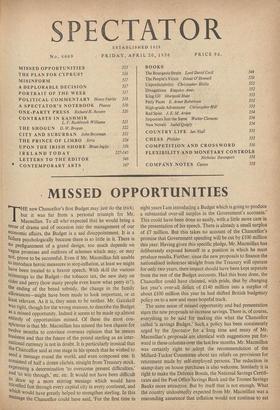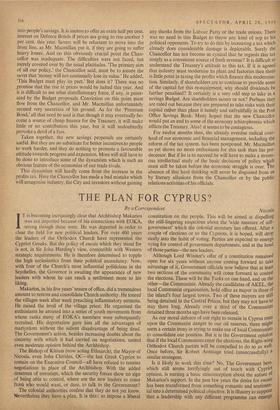MISSED OPPORTUNITIES
THE new Chancellor's first Budget may just 'do the trick; but it was far from a personal triumph for Mr. Macmillan. To all who expected that he would bring a sense of drama and of occasion into the management of our economic affairs, the Budget is a sad disappointment. It is a failure psychologically because there is so little in it. There is no prefigurement of a grand design; too much depends on vague promises and outlines of schemes which may, or may not, prove to be successful. Even if Mr. Macmillan felt unable to introduce heroic measures to stop-inflation, at least we might have been treated to a braver speech. With skill the various trimmings to the Budget—the tobacco tax, the new duty on eider and perry (how many people even know what perry is?), the ending of the bread subsidy, the change in the family allowances—might have been made to look important, or at least relevant. As it is, they seem to be neither. Mr. Gaitskell was right, though for the wrong reasons, to describe the Budget as a missed opportunity. Indeed it seems to be made up almost entirely of opportunities missed. Of these the most con- spicuous is that Mr. Macmillan has missed the best chgnce for twelve months to convince overseas opinion that he means business and that the future of the pound sterling as an inter- national currency is not in doubt. It is particularly ironical that the Chancellor said at one stage in his speech that he wished to send a message round the world, and even composed one. It Consisted of half a dozen clichés, straight from Treasury stock, expressing a determination 'to overcome present difficulties.' and 'to win through,' etc. etc. It would not have been difficult .1 0 draw up a more stirring message which would have travelled fast through every capital city in every continent, and which would have greatly helped to strengthen sterling. In this message the Chancellor could have said, For the first time in eight years I am introducing a Budget which is going to produce a substantial over-all surplus in the Government's accounts.' This could have been done so easily, with.a little more care in the presentation of his speech. There is already a small surplus of £7 million. But this takes no account of the Chancellor's promise that Government spending will be cut by £100 million this year. Having given this specific pledge, Mr. Macmillan has deliberately exposed himself in a position in which he must produce results. Further, since the new proposals to finance the nationalised industries straight from the Treasury will operate for only two years, their impact should have been kept separate from the rest of the Budget accounts. Had this been done, the Chancellor could have claimed, with pride, that by changing last year's over-all deficit of £140 million into a surplus of about £100 million this year he had shifted British budgetary policy on to a new and more hopeful track.
The same sense of missed opportunity and bad presentation mars the new proposals to increase savings. There is, of course, everything to be said for making this what the Chancellor called 'a. savings Budget.' Such a policy has been consistently urged by the Spectator for a long time and many of Mr. Macmillan's proposals are identical with suggestions put for- ward in these columns over the last few months. Mr. Macmillan was certainly right to adopt the recommendation of the Millard-Tucker Committee about tax reliefs on provisions for retirement made by self-employed persons. The reduction in stamp duty on house purchases is also welcome. Similarly it is right to make the Defence Bonds, the National Savings Certifi- cates and the Post Office Savings Bank and the Trustee Savings Banks more attractive. But by itself that is not enough. What the country undoubtedly expected from Mr. Macmillan was a resounding assurance that inflation would not continue to eat into people's savings. It is useless to offer an extra half per cent. interest on Defence Bonds if prices are going to rise another 5 per cent. this year. Savers will be reluctant to move into the front line, as Mr. Macmillan put it, if they are going to suffer heavy losses. And on this obviously crucial point the Chan- cellor was inadequate. The difficulties were not faced, but merely covered over by the usual platitudes. 'The primary aim of all our policy,' the Chancellor said, must be to assure the saver that 'money will not continually lose its value.' He added, 'This Budget must play its part.' But does it? There was no promise that the rise in prices would be halted this year. And it is difficult to see what disinflationary force, if any, is gener- ated by the Budget proposals. Conviction on this point must flow from the Chancellor, and Mr. Macmillan unfortunately seemed very uncertain of his ground. As for the 'Premium Bond,' all that need be said is that though it may eventually be- come a source of cheap finance for the Treasury, it will make little or no contribution this year, but it will undoubtedly provoke a devil of a fuss. Taken together, the new savingS proposals are certainly useful. But they are no substitute for better incentives/to people to work harder, and they do nothing to promote a favourable attitude towards progress and expansion. More will still have to be done to introduce some of the dynamism which is such an obvious feature of the economies of our trade rivals.
This dynamism will hardly come from the increase in the profits tax. Here the Chancellor has made a bad mistake which will antagonise industry, the City and investors without gaining any thanks from the Labour Party or the trade unions. There was no need in this Budget to throw any kind of sop to his political opponents. To try to do this by increasing a tax which already does considerable damage is deplorable. Surely the Chancellor has not become so cynical that he regards this tax simply as a convenient source of fresh revenue? It is difficult to understand the Treasury's attitude to this tax. If it is agreed that industry must modernise its plant and factories then there is little point in taxing the profits which finance this modernisa- tion. Similarly, if shareholders are to continue to provide some of the capital for this re-equipmept, why should dividends be further penalised? It certainly is a very odd step to take in a savings Budget. Are shareholders savers or not? Perhaps they are ruled out because they are prepared to take risks with their capital rather than place it tamely and unfruitfully in the Post Office Savings Bank. Many hoped that the new Chancellor would put an end to some of the economy schizophrenia which afflicts the Treasury. Alas ! it seems to be contagious.
For twelve months then, the already overdue radical over- haul of our economic and financial management, including the reform of the tax system, has been postponed. Mr. Macmillan as yet shows no more enthusiasm for this task than his pre- decessor. But if he is to succeed he will have to make a strenu- ous intellectual study of the basic decisions of policy which must still be taken before the economic struggle is over. The absence of this hard thinking will never be disguised from us by literary allusions from the Chancellor or by the public relations activities of his officials.



















































 Previous page
Previous page